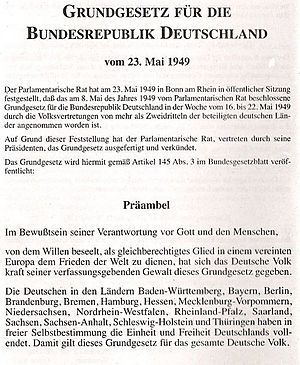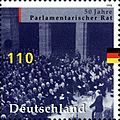Basic Law of the Federal Republic of Germany facts for kids
| Germany |
 This article is part of the series: |
|
|
|
|
|
|
|
|
Other countries · Atlas |
The Basic Law of the Federal Republic of Germany is the name of Germany's constitution. It was written in 1949 when Germany was divided into two countries: East Germany and West Germany. This new law was very different from the earlier constitution of the Weimar Republic.
The people who wrote it didn't call it a "constitution" because they hoped it would only be a temporary rule for West Germany. They wanted the two Germanys to become one country again soon.
It took more than 40 years for East Germany and West Germany to reunite. But even after they became one country, they decided to keep the original name: Basic Law.
Contents
Protecting Germany's Basic Law
The Federal Constitutional Court (in German: Bundesverfassungsgericht) makes sure the Basic Law is followed. This court can stop laws that go against the Basic Law. There are also "eternal clauses" in the Basic Law that can never be changed, not even by new laws.
For example, Article 1, which talks about human life and dignity, and Article 20, which sets out basic principles, are protected. This is to make sure that terrible things like the Nazi period never happen again. During that time, the Nazis passed a special law that allowed Hitler to rule without needing approval from others.
The Five Main Parts of Government
Germany is a federal parliamentary democracy. This means power is shared between the central government and the states, and people vote for representatives in parliament. To show how this works, there are five main "constitutional institutions" or parts of the government.
The President
The Federal President (German: Bundespräsident) is the head of state. This job is mostly ceremonial, like a national symbol, and has only a small role in everyday politics. The president does not have as much power as the president of the Weimar Republic or the President of the United States.
The president formally signs laws before they become active and appoints federal officials. However, the president cannot decide to end the parliament (Bundestag) or choose a new chancellor without most members of parliament agreeing.
The Executive Branch
The Chancellor is chosen by the Bundestag, which is Germany's parliament. The Chancellor is the head of the executive branch, which means they lead the government. They also lead the federal Cabinet, which is a group of top ministers.
The Judicial Branch
The Judicial branch is made up of the Federal Constitutional Court and five other Supreme Courts. There are also local and regional courts that make the first decisions in legal cases. Their decisions can be reviewed by higher courts, including the Supreme Courts.
Federal Constitutional Court
The Federal Constitutional Court is the most important court in Germany. Its main job is to protect the Basic Law. The decisions made by this court are very powerful, almost like laws themselves. The court can cancel laws if they go against the Basic Law.
Other Supreme Courts
Germany has five other Supreme Courts that handle different types of legal cases:
- The Federal Social Court handles cases about social security, pensions, and health insurance.
- The Federal Labour Court deals with cases about work, like job contracts and agreements with trade unions.
- The Federal Tax Court hears cases about tax and customs laws.
- The Federal Administrative Court handles cases involving government bodies. This could be if someone feels treated unfairly by the government.
- The Federal Supreme Court is the highest court for all other civil and criminal cases.
The Legislative Branch
The legislative branch is the part of government that makes laws. It has two of the main constitutional bodies.
The Bundesrat
The Bundesrat is Germany's upper house of parliament. It represents the different Länder (states) of Germany. It shows that Germany is a federal state, meaning power is shared between the central government and the states. This federal system is one of the "eternal clauses" of the Basic Law and can never be changed.
The Bundestag
The Bundestag is the part of the legislature that is chosen by elections. The Chancellor must be a member of the Bundestag.
Other Important Rules
The Military
The Weimar Constitution allowed the army (Reichswehr) to be outside the control of parliament or the public. The army reported directly to the president, who didn't have to report to parliament.
Under the Basic Law, the Defence Forces, called the Bundeswehr, are responsible to parliament. This means:
- During times of peace, the Bundeswehr reports to the Minister of Defence.
- During times of war, it reports to the Chancellor.
The Chancellor is directly responsible to parliament. The Minister of Defence is also responsible to parliament because parliament can remove the government by choosing a new chancellor.
The Basic Law also created a special person called a soldiers' ombudsman, or Wehrbeauftragter. This person reports to parliament, not to the government. Soldiers can write directly to the Wehrbeauftragter if they feel they have been treated unfairly or illegally. They cannot be punished for doing so.
In the 1990s, the Constitutional Court made it clear that the Bundeswehr cannot be used by the government outside of NATO territory unless the Bundestag first gives permission. This permission must be in a special resolution that describes where the Bundeswehr will go and for how long.
Referendums
The Basic Law only allows referendums (votes by the people) about changing the borders of the Länder (states). There have been two such referendums:
- In 1952, Baden-Württemberg was created after a referendum approved joining three separate states.
- In 1996, the people living in Berlin and Brandenburg voted not to join their two states together.
How the Basic Law Has Changed Since 1949
Important changes to the Basic Law include bringing back conscription (mandatory military service) and creating the Bundeswehr in 1956.
During reunification, East Germany and West Germany decided not to write a completely new constitution. Instead, they kept the old Basic Law because it had worked well in West Germany. The Basic Law was changed to allow East Germany to join. It was then changed again to make it clear that Germany did not want any more territory, a promise made in the Final Settlement.
Related pages
Former constitutions
- Constitution of the German Empire (1871-1919)
- Weimar Constitution (1919-1933)
- Constitution of the German Democratic Republic (German Democratic Republic; GDR, 1949-1990)
Others
- Bremen clause
- Bundesrechnungshof
- German Emergency Acts
- History of Germany
- Politics of Germany
- Constitution
- Constitutionalism
- Constitutional economics
Images for kids
-
The Grundrechte (Basic Rights) at Jakob Kaiser House, Berlin
-
West German ministers-president debating the Frankfurt Documents in Koblenz
See also
 In Spanish: Ley Fundamental para la República Federal de Alemania para niños
In Spanish: Ley Fundamental para la República Federal de Alemania para niños
 | Bessie Coleman |
 | Spann Watson |
 | Jill E. Brown |
 | Sherman W. White |








